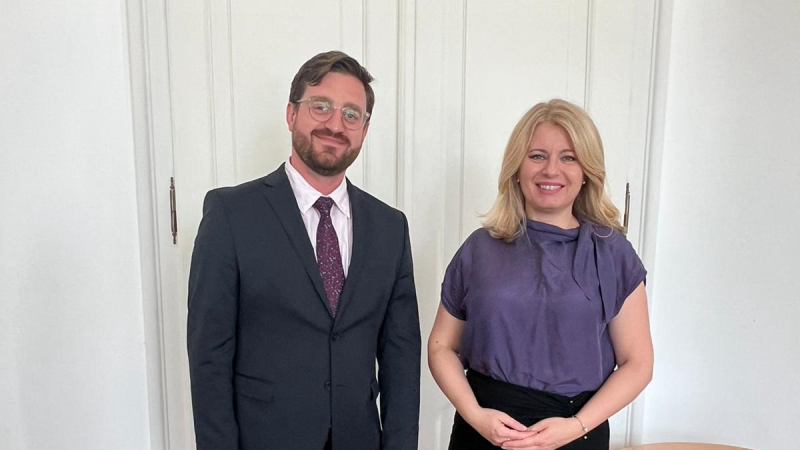
As Slovakia Votes, Support for Ukraine Hangs in the Balance
By Nayan Seth, MGA 2024 Candidate, The Fletcher School
When Slovakia’s population of 5 million people votes on September 30 to elect the next government, it may not just seal the fate of its own political leaders. The Slovak parliamentary election could also have wide-ranging ramifications for European unity over the Russian invasion of Ukraine.
Slovakia, a NATO and EU member, has been one of Ukraine’s staunchest supporters since the escalation of the war in February 2022. It was one of the first countries to help supply Kyiv with missiles and fighter jets. But that could change soon.
Vladimir Lackovic, a Fletcher Master of Global Affairs (MGA) candidate, worked in the office of President Zuzana Čaputová in the run-up to the election. “There is a little bit of frustration in [Slovakian] society,” Lackovic observed. “People are turning to more populist than right-wing parties or extremist parties,” he said, reflecting on voters’ mood ahead of Slovakia’s most significant election in decades.

Lackovic pointed to recent opinion poll numbers that project former Prime Minister Robert Fico and his political party, Smer, as the likely contender to lead the next government. Fico, a populist leader, is polling at around 20 percent at the no.1 spot.
On the campaign trail, he has adopted a pro-Russian stance and has questioned the current government’s outright support of Ukraine. “If Smer is part of the government, we won’t send any arms or ammunition to Ukraine anymore,” Fico recently told the Associated Press.
His support for Russia is complemented by a sophisticated Russian disinformation campaign that Lackovic said is not a new phenomenon. “This is a long-term misinformation or disinformation campaign that has been waged by Russia since… the late 2010s, especially after the occupation of Crimea.”
The pro-Russian frontrunner’s populist tirades and the disinformation campaign seem to be showing results. According to a survey by Bratislava-based think tank Globsec, over half of Slovaks believe the West or Ukraine are “primarily responsible” for the war, while only 40 percent believe that Russia should be held responsible.
Lackovic believes these factors are not just influencing the voters, but also political leaders. “It’s got to a point now that some of the political parties that were previously a little bit more Western and EU-oriented have now resorted to this populist rhetoric because they know that’s where the population is. They’re speaking to the people who believe that Putin is a good guy here and that we shouldn’t support Ukraine. So they’re reinforcing those thoughts.”
The possibility of Fico’s return could test NATO and European unity over the war in Ukraine. If Fico wins, analysts say Viktor Orban of Hungary may well find support in disrupting future decisions on Ukraine.
Lackovic said that Fico and Orban joining hands remains a possibility. “It’s going to leave Slovakia isolated within the EU and NATO, and Slovakia would likely then block membership of Ukraine in EU and NATO. It would give Hungary and Slovakia, as a team, more power to block these things.”
Domestically, the government’s perceived past mishandling of multiple crises and political instability isn’t helping its cause. Slovakia has had four prime ministers in the last five years. The fragility of coalition politics coincided with a global pandemic, Russia’s invasion of Ukraine, and rising energy and food prices.
“The inflation was a big part of the problem. People want to have a strong leader, who knows how to create peace and stability in the country, even though Robert Fico is tied to corruption scandals,” Lackovic said.
Fico has been the prime minister twice, first from 2006-2010 and then from 2012-2018. He was forced to resign in 2018 after Slovakian investigative journalist Jan Kuciak and his fiancée Martina Kusnirova were murdered. Kuciak had reported on big-ticket corruption in the government.
“As prime minister, Fico created a system of corruption that allowed oligarchs and others with personal agendas access to those in the highest levels of government, including him,” Lackovic said.
In June 2019, the environmental activist and lawyer Zuzana Čaputová dramatically won the presidential election, becoming the first woman to be elected to a historically largely ceremonial post. A pro-European figure, Čaputová is one of the strongest supporters of Ukraine.
Lackovic shared his experience of working in her presidential office. “I worked directly with the foreign policy adviser to the president. I’ve worked with her, but also with the team at the whole Department of Foreign Affairs. So I feel like in those two months, I did maybe a year’s amount of work.”
During his stint, Lackovic also worked on the Bucharest 9 or B9 summit, which happened in Slovakia’s capital Bratislava in June. The B9 group includes Bulgaria, Czechia, Estonia, Hungary, Latvia, Lithuania, Poland, Romania, and Slovakia. The June summit was attended by NATO Secretary General Jens Stoltenberg.
“[The B9 summit] always happens before the NATO summit, just to make sure that the eastern flank countries come together and speak in a unified voice. So that was really interesting…to see what the cooperation is among those countries, and how these summits come together.”
During his meeting with Slovakian interim Prime Minister Ľudovít Ódor, Stoltenberg asserted, “Slovakia can rely on NATO.” The election results after September 30 may decide if NATO can continue to rely on Slovakia.
